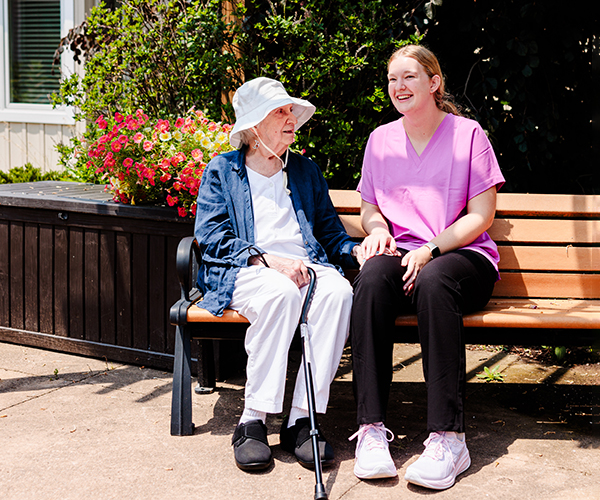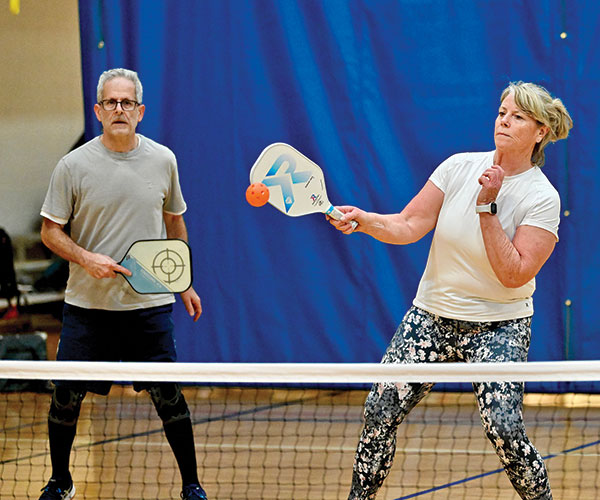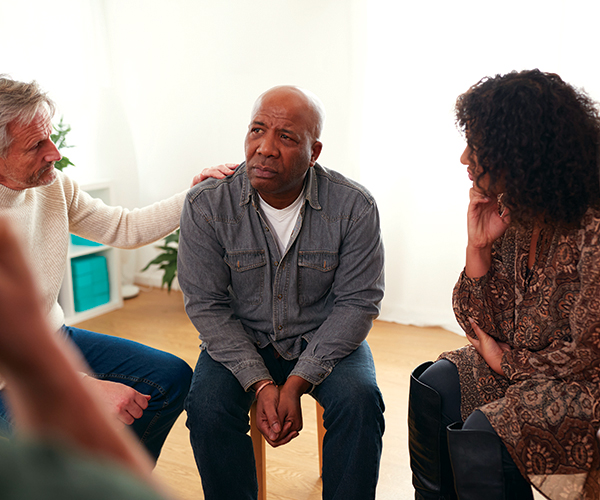Going dancing, taking a yoga class, having a romantic dinner: Do these sound like your plans this Valentine’s Day? If not — if you’re thinking, “I’m too old for yoga,” or, “My spouse has been gone for years now, so forget dinner and dancing” — think again.
Too often we think staying healthy only means keeping our bodies in shape and avoiding illness. Yet staying healthy also means tending to your emotional well-being. This is especially true for seniors who are facing the changes aging brings, many of them involving loss: of friends, family or spouse, physical strength and mobility, or independence. The feelings of loneliness and isolation that often accompany loss can affect a person’s emotional health, and sometimes physical health as well.
The good news is there are plenty of ways to alleviate those feelings of loneliness and improve your emotional state. From support groups and senior community center programs to volunteering and card clubs, every area senior can find something to get involved in, regardless of living situation or mobility problems.
“For me, and generally for people in old age, the feeling of loss is overwhelming,” says Josephine Rich, 88. “And not just [losing] my husband, but the loss of the feeling of the way the world was.” For seniors like Rich, whose husband of 63 years died in June from skin cancer, life can seem particularly lonely.
“I have noticed John not being here a lot more recently,” she says. “I would always come home from one of my walks and tell him about how I made an acquaintance with a dog or saw a beautiful flower. Now I don’t have anyone to tell when I come in.”
But life has gone on for her. Though many doctors and therapists advocate keeping busy to cope with grief, Rich, a resident of Judson Park in University Circle, says she needed a lot of time to herself.
“I needed that time to grieve. I said no to a lot of people and didn’t feel bad about it.” She says solitary activities helped her cope. “I journal, so I get rid of a lot that way. If I’m having a bad time, I go for a walk or get on the treadmill. It’s not only good for you physically, but emotionally it’s wonderful.” While she has been enjoying time alone, Rich is reconnecting with her Prayer Shawl Ministry knitting organization and has begun volunteering.
For other seniors, loneliness persists long after loss, and may be accompanied by signs of depression: anxiety, fatigue, feelings of worthlessness, restlessness, irritability, loss of interest in hobbies, sleep problems or a change in eating habits. According to the National Institutes of Health, about 7 million seniors, or one in five Americans age 65 or older, suffer from some form of depression.
The causes are often biological, says Christine Nelson, coordinator of the Senior Care Assessment Center at Lakewood Hospital. Depression’s triggers, she says, include cardiovascular disease and stroke, which can contribute to depression if it occurs in a specific region of the brain. But Nelson says depression is treatable with medication, counseling, emotional support or a combination of all three.
Linda Mervar, a social worker at Judson Park in University Circle, encourages all seniors to stay active, exercise and eat well to help boost their spirit. Nothing can substitute for meaningful relationships, she adds.
“No matter how bad our seniors are feeling, if they come to the center and interact with other people, the depression is usually handled,” adds Yasenka Goverdovski, a clinical managerat the Lakewood Office on Aging. “It’s the ones who are isolated that we really worry about.”
So just how do you form new, meaningful relationships if you have lost a spouse or a good friend? Or if you are in a wheelchair with limited mobility?
Try volunteering.
“This is a time in life where there is time to do things that involve other people that are significant and bring great value,” Mervar says. Spending the day serving food at a local homeless shelter or visiting children at a hospital or other seniors at a nursing home could become an indispensable part of your weekly routine.
RSVP of Greater Cleveland, an organization for retired volunteers, has more than 3,200 volunteers working at more than 200 nonprofit agencies in the Cleveland area, says special project coordinator Sue Smith. Seniors usher at Playhouse Square, tutor kids and help out with Meals on Wheels. “All we hear is, ‘I get back more than I give,’ ” she says. “Some start out doing very little, and it turns into a full-time job.”
Mobility and physical impairment are not issues. Smith says many senior volunteers don’t have cars and ride the bus to get around. People who can’t leave their home or bed can still volunteer. For instance, they can call other seniors to wish them a happy birthday or send out mailings.
If volunteering isn’t for you, senior centers throughout the area have weekly programs and support groups for every interest. Religious groups are also a great outlet for meeting people and staying involved in the community. Other options for an emotional pick-me-up include adopting an older pet from a shelter, taking a yoga or other exercise class for seniors, or learning a new skill, such as knitting, painting or photography.
If you live in an independent or assisted-living community, consider joining its lunch or dancing group or sign up for organized trips to museums or concerts.
With Valentine’s Day just around the corner, don’t forget that romantic love and companionship do wonders for the soul. For single, widowed or divorced seniors, rediscovering such bonds may be an option that revitalizes emotional wellness.
“I know a couple who met in a nursing home, got married and lived there,” says Norbert Rahl, director of mental health services for the Eldercare Services Institute near University Circle. “I worked with another gentleman who dated several women and finally married one. He met them at senior citizen lunch programs.”
Rahl also suggests meeting people at local libraries’ community sessions. “Getting out to any place that other people will be greatly improves the odds of being able to meet like-minded people and develop connections,” he says.
So, if this article finds you without plans this Valentine’s Day, why not pick up the phone and call one of the places on our list? This year, instead of watching friendships unfold on “Grey’s Anatomy,” you can form new, meaningful relationships and watch them blossom instead.
Too often we think staying healthy only means keeping our bodies in shape and avoiding illness. Yet staying healthy also means tending to your emotional well-being. This is especially true for seniors who are facing the changes aging brings, many of them involving loss: of friends, family or spouse, physical strength and mobility, or independence. The feelings of loneliness and isolation that often accompany loss can affect a person’s emotional health, and sometimes physical health as well.
The good news is there are plenty of ways to alleviate those feelings of loneliness and improve your emotional state. From support groups and senior community center programs to volunteering and card clubs, every area senior can find something to get involved in, regardless of living situation or mobility problems.
“For me, and generally for people in old age, the feeling of loss is overwhelming,” says Josephine Rich, 88. “And not just [losing] my husband, but the loss of the feeling of the way the world was.” For seniors like Rich, whose husband of 63 years died in June from skin cancer, life can seem particularly lonely.
“I have noticed John not being here a lot more recently,” she says. “I would always come home from one of my walks and tell him about how I made an acquaintance with a dog or saw a beautiful flower. Now I don’t have anyone to tell when I come in.”
But life has gone on for her. Though many doctors and therapists advocate keeping busy to cope with grief, Rich, a resident of Judson Park in University Circle, says she needed a lot of time to herself.
“I needed that time to grieve. I said no to a lot of people and didn’t feel bad about it.” She says solitary activities helped her cope. “I journal, so I get rid of a lot that way. If I’m having a bad time, I go for a walk or get on the treadmill. It’s not only good for you physically, but emotionally it’s wonderful.” While she has been enjoying time alone, Rich is reconnecting with her Prayer Shawl Ministry knitting organization and has begun volunteering.
For other seniors, loneliness persists long after loss, and may be accompanied by signs of depression: anxiety, fatigue, feelings of worthlessness, restlessness, irritability, loss of interest in hobbies, sleep problems or a change in eating habits. According to the National Institutes of Health, about 7 million seniors, or one in five Americans age 65 or older, suffer from some form of depression.
The causes are often biological, says Christine Nelson, coordinator of the Senior Care Assessment Center at Lakewood Hospital. Depression’s triggers, she says, include cardiovascular disease and stroke, which can contribute to depression if it occurs in a specific region of the brain. But Nelson says depression is treatable with medication, counseling, emotional support or a combination of all three.
Linda Mervar, a social worker at Judson Park in University Circle, encourages all seniors to stay active, exercise and eat well to help boost their spirit. Nothing can substitute for meaningful relationships, she adds.
“No matter how bad our seniors are feeling, if they come to the center and interact with other people, the depression is usually handled,” adds Yasenka Goverdovski, a clinical managerat the Lakewood Office on Aging. “It’s the ones who are isolated that we really worry about.”
So just how do you form new, meaningful relationships if you have lost a spouse or a good friend? Or if you are in a wheelchair with limited mobility?
Try volunteering.
“This is a time in life where there is time to do things that involve other people that are significant and bring great value,” Mervar says. Spending the day serving food at a local homeless shelter or visiting children at a hospital or other seniors at a nursing home could become an indispensable part of your weekly routine.
RSVP of Greater Cleveland, an organization for retired volunteers, has more than 3,200 volunteers working at more than 200 nonprofit agencies in the Cleveland area, says special project coordinator Sue Smith. Seniors usher at Playhouse Square, tutor kids and help out with Meals on Wheels. “All we hear is, ‘I get back more than I give,’ ” she says. “Some start out doing very little, and it turns into a full-time job.”
Mobility and physical impairment are not issues. Smith says many senior volunteers don’t have cars and ride the bus to get around. People who can’t leave their home or bed can still volunteer. For instance, they can call other seniors to wish them a happy birthday or send out mailings.
If volunteering isn’t for you, senior centers throughout the area have weekly programs and support groups for every interest. Religious groups are also a great outlet for meeting people and staying involved in the community. Other options for an emotional pick-me-up include adopting an older pet from a shelter, taking a yoga or other exercise class for seniors, or learning a new skill, such as knitting, painting or photography.
If you live in an independent or assisted-living community, consider joining its lunch or dancing group or sign up for organized trips to museums or concerts.
With Valentine’s Day just around the corner, don’t forget that romantic love and companionship do wonders for the soul. For single, widowed or divorced seniors, rediscovering such bonds may be an option that revitalizes emotional wellness.
“I know a couple who met in a nursing home, got married and lived there,” says Norbert Rahl, director of mental health services for the Eldercare Services Institute near University Circle. “I worked with another gentleman who dated several women and finally married one. He met them at senior citizen lunch programs.”
Rahl also suggests meeting people at local libraries’ community sessions. “Getting out to any place that other people will be greatly improves the odds of being able to meet like-minded people and develop connections,” he says.
So, if this article finds you without plans this Valentine’s Day, why not pick up the phone and call one of the places on our list? This year, instead of watching friendships unfold on “Grey’s Anatomy,” you can form new, meaningful relationships and watch them blossom instead.



